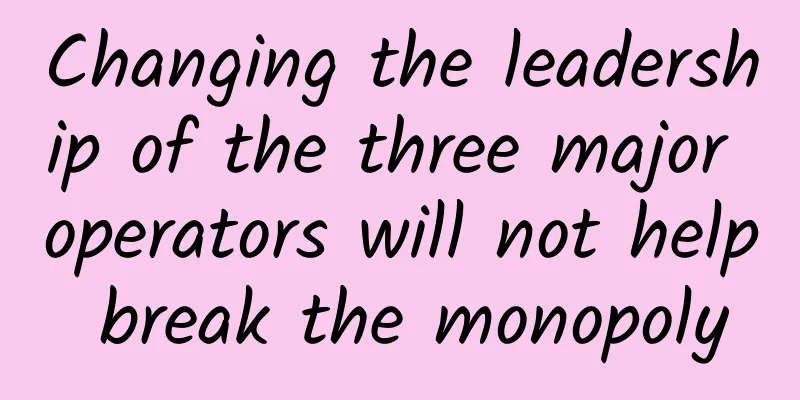Changing the leadership of the three major operators will not help break the monopoly

|
When a cadre serves in a certain enterprise for a long time, especially when the top leaders are all from the same unit and promoted by the previous top leaders, it is easy to form factions or interest groups, which will lead to corruption. In addition to corruption, problems such as a single working environment and limited vision are also inevitable. In addition, long-term service in a certain position is more likely to lead to a situation where one person has the final say, which is not conducive to the company's openness to communication and democratic decision-making. In short, when the top leader of a unit is re-elected for a long time or "inbreeding", this unit, especially the enterprise, is basically self-contained and lacks vitality. As a winner of Toutiao's Qingyun Plan and Baijiahao's Bai+ Plan, the 2019 Baidu Digital Author of the Year, the Baijiahao's Most Popular Author in the Technology Field, the 2019 Sogou Technology and Culture Author, and the 2021 Baijiahao Quarterly Influential Creator, he has won many awards, including the 2013 Sohu Best Industry Media Person, the 2015 China New Media Entrepreneurship Competition Beijing Third Place, the 2015 Guangmang Experience Award, the 2015 China New Media Entrepreneurship Competition Finals Third Place, and the 2018 Baidu Dynamic Annual Powerful Celebrity. |
<<: stateof.ai: 2020 Artificial Intelligence Report
Recommend
How much does it cost to develop a wine utensils mini app in Ganzhou?
There are two types of Ganzhou wineware WeChat ap...
China Association of Automobile Manufacturers: Brief analysis of customs import and export situation from January to February 2023
According to data from the General Administration...
Loopy, the top-ranked app on the Internet, is a "worker" that can be killed by a tree.
Recently, the most popular emoticon in the world ...
Under what circumstances will the Douyin store deposit be deducted? Why was the Douyin store deposit deducted?
Since the establishment of Douyin store groups, m...
Short video shooting and operation skills!
Everyone wants to make money by shooting short vi...
Can you really get over your ex? It might be hard...
Leviathan Press: If you were asked to recall and ...
Physical examination report says low bone density? Don’t rush to take calcium tablets, here is the truth!
When low bone density is found during a physical ...
Why did Steve Jobs forbid his children from using iPads at home?
Although Apple invented the iPad, as one of the im...
Zhangping SEO training: What kind of SEO is reliable? Is search engine optimization good?
Although there are many corporate website constru...
5 formulas to analyze the growth secrets of soul APP
As a stranger social product, Soul has establishe...
The "Roof of the World" was originally a "Valley"! What happened to the Qinghai-Tibet Plateau?
Author: Han Yangmei The Qinghai-Tibet Plateau, th...
Locking the list, what is Apple doing? A bold guess
As of the afternoon of January 5, the App Store h...
How to improve the community’s operational processes and refine its operations?
Community operation is a very complex job, even m...
How to prevent user churn starting from the user life cycle?
I've been thinking about some things about us...









